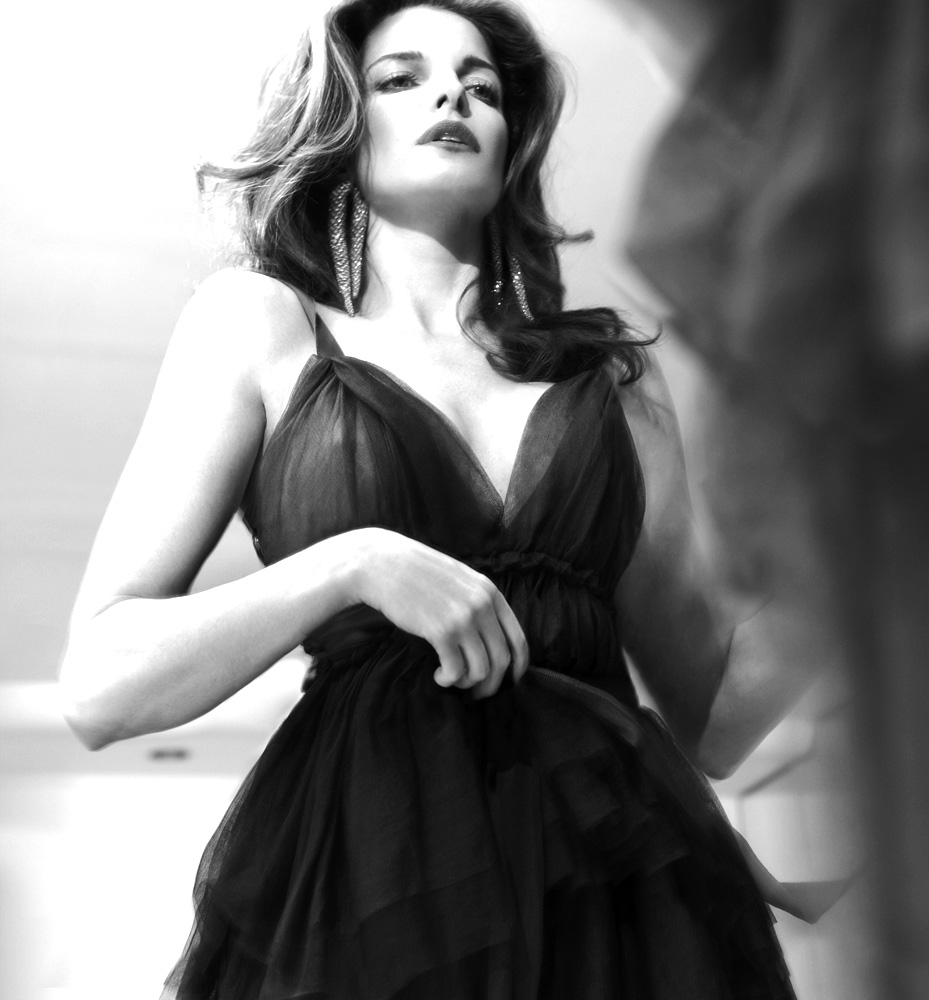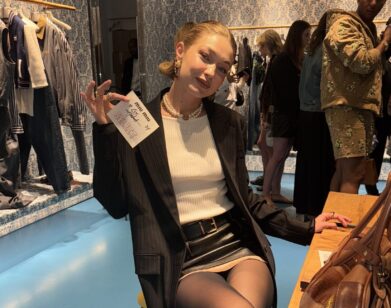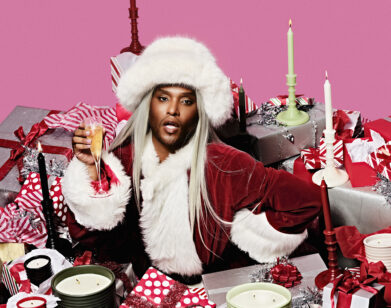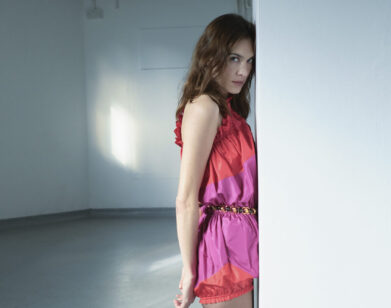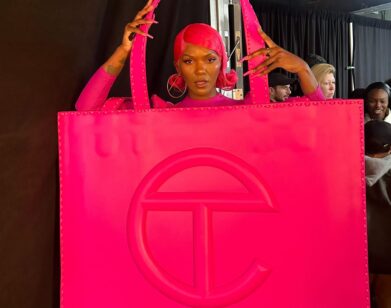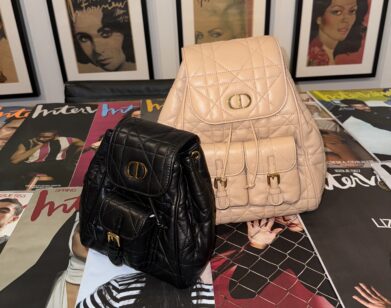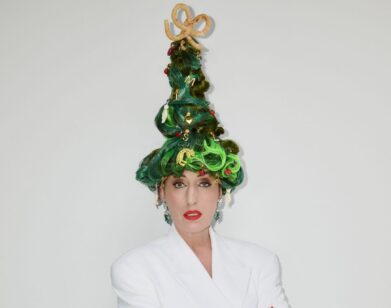Alber Elbaz
The logo of Lanvin, the world’s oldest running couture fashion house, is a mother and daughter holding hands. While most designers today might find that sentiment a little too charming and sincere for high fashion, it seemed perfectly in keeping with what head designer Alber Elbaz had in mind when he took over the label in 2001. Women—young and old, skinny and shapely, uptown and downtown—all seem to have fallen for the cult of Lanvin. (Is it still a cult when it embraces everybody?) The real question is: How many mothers and daughters have let a Lanvin dress come between them? I was first introduced to Elbaz’s designs five years ago. What immediately impressed me about his work was its refusal to follow trends for the sake of grabbing attention. This isn’t just cocktail-party attire—Elbaz’s economy of cuts and silhouettes, his simplicity of form, and his generosity in thinking about shapes and sizes that are wearable on countless occasions are what single him out as a genuine realist over simple shock-and-awe maestros in the pantheon of French fashion. The 47-year-old designer was born in Morocco, grew up in Israel, cut his teeth in New York assisting Geoffrey Beene, and spread his wings for a while at Yves Saint Laurent before coming into his own at the helm of the almost-forgotten French-label-that-could for the last eight years. What’s most impressive is how Elbaz started slowly and quietly, without any bells or whistles. The results are dresses, jewelry, shoes—and even his signature ribbons—that won’t ever go out of style. We will all still be wearing Lanvin in 10 years. Take his trench coat from Spring 2008: What woman can’t enjoy a beautiful silk trench coat? The fact that all of us look good in the same thing shows how much Elbaz loves women. He wants his clothes to fit their lives, and not the other way around. While I’d been to the Lanvin store in Paris on several occasions, I’d never had the honor of meeting Elbaz face to face until we met for lunch recently at Il Cantinori in New York. We sat down over soup for a chat about why fashion is meaningful in tough times, why women make better drivers than men, and why a little competition amongst colleagues can be a very inspiring thing.
STEPHANIE SEYMOUR BRANT: Was your mother a hairdresser?
ALBER ELBAZ: No, my father—a colorist. My mother was a painter. They both worked with colors.
SEYMOUR BRANT: Do you love living in Paris? You grew up in Israel, right?
ELBAZ: Yes, but I love places in general . . . It depends on the people. I used to hate L.A., but I met such a great group of people there that I fell in love with it. When I’m traveling the world, I don’t ever look anymore at the geography—just enough to catch galleries and paintings. Mostly, I look at the people, and people are what give me the energy. I am very much a people person. If I am in a beautiful place but I don’t like the people, I am miserable. The big room or big suite doesn’t mean a lot to me. It is what the people do or don’t do that matters. I think that we are in a very strange time today, when everybody is thinking about what is going to happen, and everybody is kind of cleaning house a little bit. In the fashion world, we are doing something similar. We are taking the fake out and being a little bit more real and simple. In fashion, we have a reputation for being such a façade—fake people—but none of the fashion people who I know are fake.
SEYMOUR BRANT: I completely agree.
ELBAZ: I know amazing people in fashion who are anything but fake. They are very real and very sensitive. They are happy and sad. They are loyal friends. I had a little press conference yesterday. I opened the speech talking about Heidi Klum, who does Project Runway. At the beginning of the show she says, “In fashion, one day you’re in, and the next day you’re out.” Every time I hear that, I die. I love the show and I like her, but I am not sure I agree with her on that. If you’re not Miss America, if you’re not the girl of the moment, then you don’t fall into the trap of being in and then being out. I think fashion is about longevity and doing your work. It isn’t about winning or losing. It’s about process—keeping it going.
SEYMOUR BRANT: All the young people in fashion worship the people who have been around a long time. I think it is about keeping something going through the generations. Take my work: Just because I’m not 20 anymore doesn’t mean that people don’t appreciate what I do. In fact, there is a whole generation of models who grew up with me who are still respected to this day. They want to say, for designers and models, you’re either in or out, but it’s not true at all.
ELBAZ: I often think about whether fashion is a reflection of everything else in life. Designers will say, “Gray is the new black,” and the next season say, “I can’t do one more gray piece.” Where does it go? How come the loyalty vanishes? Why don’t you love gray every season?
SEYMOUR BRANT: The whole season thing is nonsense. It’s either beautiful or it isn’t. That’s something I really learned when I started collecting dresses.
ELBAZ: I know you collect a lot of Azzedine [Alaïa]. He’s so good. I love him.
SEYMOUR BRANT: And he’s also such a sweet man, too. He really loves women. And I feel the same way about your clothes. There are only a handful of designers who I feel that way about.
ELBAZ: You know what it is? I love and respect women. I work mostly with women. And you know, our logo for Lanvin is a mother and a daughter. I’ve always said, “It’s not a lion, and it’s not a horse. It’s a mother and a daughter.” I find the logo very emotional. We really started from scratch eight years ago at Lanvin. It’s the oldest couture house in the world, but when I came onboard, it was a great name without much in it. We slowly moved in. I love coffee, but I always say not everything has to be instant. We took the time. It took eight years to move from 15 accounts to 400 accounts. What’s important is to maintain it as a family business. It’s very much like Interview, which you don’t talk about as a group—it’s a family. The nature of fashion is family. You see that at almost every house—it was owned first by a family. It wasn’t owned by a bank. In fact, the bankers went into fashion later . . . And look what happened to fashion!
SEYMOUR BRANT: You need for fashion to remain intimate.
ELBAZ: When it’s a family and the business is yours, you’ll do anything to maintain it, to make it happen, and it shows. When you love someone, and they love you back, then it shows. That’s what I think.
SEYMOUR BRANT: Do you have a big group-lunch every day for people working in the atelier?
ELBAZ: We all eat together at the studio. I have interns who are in charge of the food. At first they were angry. They had their masters degrees in fashion or art and they didn’t feel like they should have to go and buy food. But I said to them, “By going out and buying food for everyone, you’ll get to know Paris, and you can practice your French.” I think when our relationship starts with food bringing people together, it gets deeper. I think relationships get closer when you share more things than work . . . They talk about desire, they talk about what it is that they feel like having today.
SEYMOUR BRANT: It’s also pleasure. There’s pleasure in food and feeding people.
ELBAZ: We all eat together. I hardly eat out when I am in Paris. I don’t do lunch dates because it cuts my day. I rarely go out now. I rarely do parties. I don’t do dinners for 10 where you talk about the weather. I can’t take it. I’d rather eat at the studio, because we know each other and we won’t talk about the weather . . . So there is a starting point.
SEYMOUR BRANT: I was really impressed when we stopped by the shop in Paris. My husband had a copy of Interview that he wanted to give to you. He said, “Let’s go leave it at the shop.” I said, “You can’t do that.” He said, “Of course we can.” So we stopped in and, of course, before you know it, I was trying on dresses. I was there for three hours! And then we said, “We really just came to leave Alber this magazine.” Apparently you were upstairs, so they ran up and they returned with a little message from you that said you couldn’t come down, you were so busy working on the collection. But I thought it was touching that you were there, so accessible.
ELBAZ: You know what also, Stephanie? The easiest thing would have been to say, “Alber is not around; he is not in the office.” But they all said, “He is, and he is working.” There is truth to what I’m doing. I don’t have children. I’m always pregnant, but I never had kids. Obviously I’ve never been through labor, but I think that having a collection is the closest thing to it. You’re sweating, you’re in a good mood then a bad mood, you can’t stand it, you’re scared . . . The only thing you can do is close every door and stay on one level and protect yourself in order to be perfectly focused.
SEYMOUR BRANT: Do you still work directly on a mannequin?
ELBAZ: I do. I sketch, of course. But if you compare the sketches to the end result, they have almost nothing to do with each other. Sometimes you have a sketch, and the sketch looks wonderful in your head or on the paper, but women are not two-dimensional beings. It’s not about the front and the back. It’s about what’s in-between. That’s fashion. That’s 3-D. That’s the whole exercise.
SEYMOUR BRANT: You also like to work with a live model, right?
ELBAZ: Yes. You know, I worked with Geoffrey Beene for quite a long time. I was his assistant for seven and a half years. He was amazing. When he died, people asked, “Did he leave you anything?” I said, “He didn’t leave me any money, but he left me my profession. He taught me my work. Everything I know comes from him.”
SEYMOUR BRANT: That’s more than anything else he could give you. And there are things that your mother and father teach you that no one else can.
ELBAZ: My mother passed away recently and it was the worst time in my life. I was in New York a while back, and I called her and I had a fight with her on the phone. She could make me crazy in a second, but she could also relax me in a second. She told me, “When you get back to Paris, call me. I need to speak with my son, not with the designer.” She taught me simplicity and modesty and how much further you can go when you are humble.
SEYMOUR BRANT: To be grandiose is the easiest thing in the world. Were you a good student growing up?
ELBAZ: Yes. I remember when I went to fashion college, the secretary saw my grades and asked me why I was coming to study fashion. I thought to myself, You really have to be an idiot to go into fashion, huh?
SEYMOUR BRANT: That’s terrible. How ridiculous!
ELBAZ: My dream now is to be a doctor. I mean, if I could start all over again, I would go to medical school.
SEYMOUR BRANT: In some bizarre way, designers and doctors are similar. There is an artistry that revolves around the body.
ELBAZ: I would be a family doctor, which is a very intimate practice. But my fashion is intimate, too. I understand women. I mean, between being a mother, a daughter, a wife, a professional, you have to shift from one realm to another—you have to be perfect everywhere. In the end, you see, you have to be like a James Bond kind of person. This is what I, as a designer, have to think about. What is it that I want to give you now? Should I give you a corset so you won’t be able to breathe? Or maybe I will make sure that you will have everything but a corset. How do I make you dream during the day? How do I make you beautiful? You see, I’m not into the sexy thing, where you need to make everything glamorous and sexy. I always find it a bit opportunist, coming in with cleavage and saying, “Hello, darling.”
SEYMOUR BRANT: No, I don’t like that at all. But your clothes can be sexy.
ELBAZ: But not because they are revealing. I think it’s because they give strength. Strong and powerful people are sexy.
SEYMOUR BRANT: I love that about your dresses. When I first discovered your designs, it was in this shop I went to in Florida. They had great designers. The owner would go to Paris and handpick everything. Every once in a while I’d run across a piece of yours and I’d get so excited. It was the first time in so many years that
I put something on that made me feel the way I wanted to feel. It pulled me together. It was comfortable, sexy, and elegant—and it was artistic. Your dresses are so well made.
ELBAZ: I’m very bad at hearing compliments. But we do go through a lot of techniques and processes. I don’t like new dresses, and I don’t like vintage either. For me, almost everything we do has to be like a dress that your mother wore and that you are going to wear. This is how we bring the emotion into it. SEYMOUR BRANT: You were born in Morocco but moved to Tel Aviv at a very young age. Do you consider yourself Israeli?
ELBAZ: Yes.
SEYMOUR BRANT: Even with the excitement over the recent presidential election here in the States, do you think the young people in Israel care more about politics than in other parts of the world?
ELBAZ: It’s a different scenario. I think that one of the most difficult things to be in Israel is a mother. This is the toughest job ever. After I left Yves Saint Laurent, I wanted to quit fashion and travel the world. I read an article about a mother. Her son got injured in a terror attack and he lost his legs. He was 7 years old. This mother left her other four kids and her husband and her job and took this boy to a little room they rented near the hospital. She took care of him for two years. Every time they put prosthetics on him, he’d grow, and they wouldn’t fit, so they’d have to start all over. At that moment, you have to ask yourself: Is fashion important? Is it important to talk about luxury? Does it really matter if you’re going to wear a red dress or not? Finally, I thought, Because of that woman, it is important. You make people dream. You make people think. You have to give them stories. You have to introduce fantasy. Fashion is how we bring them into the world today. That is my job.
SEYMOUR BRANT: That’s how people get through tough times—through their imaginations. Is imagination how you set about working on your collections? Because you know women so well . . .
ELBAZ: There is also a difference between men and women. It’s so important to have that
intuition of women, that only women can give. Have you ever seen a man drive, Stephanie? They will never ask for directions, even if they are lost. Three hours they’ll go around and around and around . . . Women will ask 70 people in the first second—but they will get there sooner. I was in Sweden, just after one of my collections, to stay for three or four days by myself. Demi Moore called me, because I made her wedding dress, and it was a big secret, her getting married to Ashton Kutcher . . . She said, “Alber, it’s out, it’s in a magazine.” I was dying to see the dress on her, but I was in Sweden. I get this driver and give him the address of a magazine store. He doesn’t find it. We drive around for two hours, and I was so crazy, I went back to the hotel, checked out, and went back to Paris!
SEYMOUR BRANT: You were frustrated.
ELBAZ: I couldn’t take it! I said, “I wish I had a woman driver. She will ask and get there.”
SEYMOUR BRANT: I love it. It’s so true.
ELBAZ: Tell me I’m wrong. Please, tell me I’m wrong!
SEYMOUR BRANT: You’re right. Are you kidding me? That’s what I said to my driver when I was coming over here. He was circling and he couldn’t find the restaurant . . .
ELBAZ: The same thing happened to me. I finally leaned over and said, “Do you need some help? I know where the restaurant is.” He said, “Oh, I didn’t want to bother you.” Well, I could have walked here by that point! [laughs] This was such a nice lunch.
SEYMOUR BRANT: Yes, one of the best I’ve had in ages. I’m sorry you have to leave so soon.
ELBAZ: Time is such a thing here in New York, and I’m coming just for a few days. Sometimes it’s more difficult to talk about fashion than to do fashion. But do you know what I do? I tell the truth. Sometimes the truth makes you laugh, and sometimes it makes you cry.
SEYMOUR BRANT: But you can never go wrong with it. I like the way you are very simple about things. You don’t make everything so complicated.
ELBAZ: But, Stephanie, the construction may be very simple, but to get there is very complicated.
SEYMOUR BRANT: You didn’t study engineering, did you?
ELBAZ: No, I would be the worst engineer. I have no sense of direction, no technical skills. My boyfriend thinks that I stay with him just because he knows how to work the remote control at home. If it has buttons, I depend on him.
SEYMOUR BRANT: Maybe you just don’t want to waste your mind on those sorts of things.
ELBAZ: Sometimes I think that I am kind of either fucked-up or dyslexic. Like, my brain doesn’t get it! SEYMOUR BRANT: I am so bad. I can never work my phone. I throw one away and buy a new one, but it still doesn’t work. [laughs] It’s hard to be us.
ELBAZ: Yeah. It’s not easy being us. Everything that has to do with a machine is hard. But I live with it now. I don’t have a complex about machines—I just don’t know how to use them.
SEYMOUR BRANT: You know who is worse than either of us? Azzedine. I can’t believe he even has a cell phone. When he pulls it out, he gives it to other people to dial for him. It’s, like, the most hysterical thing. Other people pull it out of his pocket to answer it. He’s an amazing man.
ELBAZ: It’s Azzedine. He is true couture. He’s one of my big, all-time favorite favorites. I have so much respect for him. You know what? There was a time when designers really hated each other. They bad-mouthed each other constantly. Today it is an entirely different scenario. Designers send flowers to each other before the shows. There is so much respect for one another.
Competition is good. I don’t mean the kind of competition where you have to kill the other person in order to survive. I mean, when you know that the people around you are very talented and you have to be really good, even better than you have been, in order to keep up.
SEYMOUR BRANT: When you’re the only one left, there’s nothing to compare anything to. It’s completely uninteresting that way.
ELBAZ: The whole thing is to go with the positive and do the beautiful . . .

